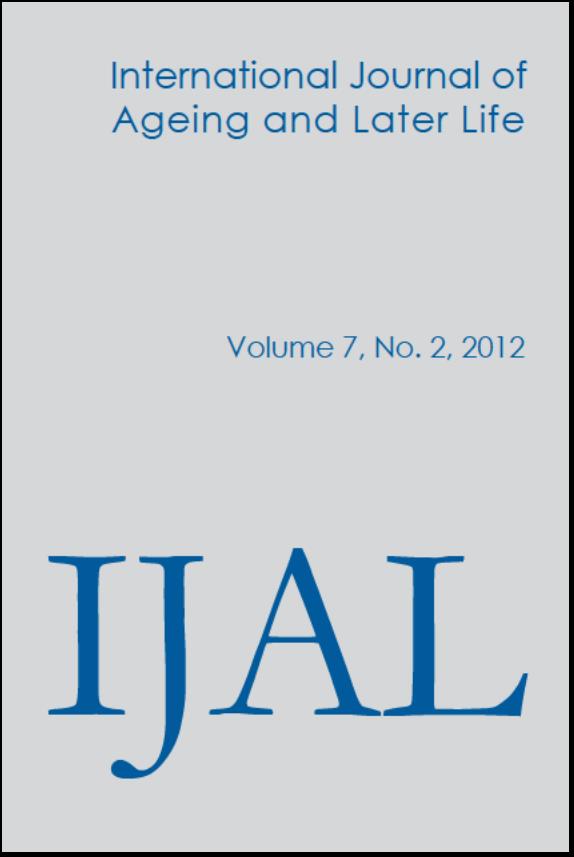An insider’s view of Alzheimer: cinematic portrayals of the struggle for personhood
Main Article Content
Abstract
This article looks at three recent films in which a person with dementia is the principal character. These films have been chosen according to the following criteria: representing different stages of dementia (early, moderate and advanced); films where the demented is the protagonist; and films challenging the biomedical view of dementia. Two of the characters are diagnosed with Alzheimer’s disease: the protagonist of Cortex (2008) is at a moderate stage, the one in Pandora’s Box (2008) is diagnosed when already in advanced stage and the third, the protagonist of Old Cats (2010), while not officially diagnosed, is in early onset of dementia. While the number of dementia films has significantly increased during the past decade, only a few access the subjective world and acknowledge the personhood of people with dementia. Made outside the mainstream film industry, making elaborate use of cinematic image and metaphor, these films, each in its own particular cinematic idiom, succeed in conveying the psychological, social and spiritual realities of dementia as they are experienced from within the protagonist’s psyche. While not denying the often bleak and painful aspects of dementia, these recent productions go against the grain, inspiring a complex, richly nuanced picture of dementia that centres around the protagonist’s stubbornly courageous struggle to forge a meaningful existence even in the direst of circumstances. These films, we believe, offer a richer and profound understating of the human aspects embedded in the phenomena of dementia.
Metrics
Article Details

This work is licensed under a Creative Commons Attribution-NonCommercial 3.0 Unported License.
Since 2020 the International Journal of Ageing and Later Life uses a Creative Commons: Attribution license, which allows users to distribute the work and to reform or build upon it without the author's permission. Full reference to the author must be given.
References
August, B. (Director/Writer), & Isaksson U. (Writer). (2001). A Song for Martin. [Motion Picture]. Sweden: Film i Väst [Swedish, English Subtitles].
Baldwin, C., Capstick, A., Phinney, A., Purves, B., OConnor, D., Chaudhury, C. & Bartlett, R. (2007). Personhood. Critical commentary. In C. Baldwin & A. Capstick (eds.), Tom Kitwood on Dementia: A Reader and Critical Commentary (pp. 173–187). Maidenhead, UK: Open University Press.
Basting, A. D. (2009). Forget Memory: Creating Better Lives for People with Dementia. Baltimore, MD: Johns Hopkins University Press.
Beard, R. L. (2004). In their voices: Identity preservation and experiences of Alzheimers disease. Journal of Aging Studies 18(4): 415–428. DOI: 10.1016/j.jaging.2004.06.005
Behuniak, S. M. (2011). The living dead? The construction of people with Alzheimers disease as zombies. Aging and Society 31(1): 70–92. DOI: 10.1017/S0144686X10000693
Bergman, I. (Writer/Director). (1957). Wild Strawberries. [Motion Picture]. Sweden: Svensk Filmindustri. [Swedish, English Subtitiles].
Boukhrief, N. (Writer/Director), & Moreau, F. (Writer). (2008). Cortex. [Motion Picture]. France: Les Films du Worso [French, English Subtitles].
Chivers, S. (2011). The Silvering Screen: Old Age and Disability in Cinema. Toronto: University of Toronto Press.
Cohen-Mansfield, J., Golander, H. & Arnheim, G. (2000). Self-Identity in older persons suffering from dementia: Preliminary results. Social Science and Medicine 51(3): 381–394. DOI: 10.1016/S0277-9536(99)00471-2
Dönmez-Colin, G. (2010). Women in Turkish cinema: Their presence and absence as images and as image-makers. Third Text 24(1): 91–105. DOI: 10.1080/09528820903488976
Filley, C. M. (2008). Caregivers take center stage in The Savages. The Savages directed by Tamara Jenkins. Searchlight Pictures 2007. Neurology Today 8(3): 20. DOI: 10.1097/01.NT.0000311359.40689.3a
Herskovits, E. (1995). Struggling over subjectivity: Debates about the self and Alzheimers disease. Medical Anthropology Quarterly New Series 9(2): 146–164.
Jenkins, T. (Writer/Director). (2007). The Savages. [Motion Picture]. USA: Fox Searchlight Pictures.
Kitwood, T. (1997). Dementia Reconsidered: The Person Comes First. Buckingham, UK: Open University Press.
Kontos, P. C. (2005). Embodied selfhood in Alzheimers disease: Rethinking person-centered care. Dementia 4(4): 553–570. DOI: 10.1177/1471301205058311
Lyman, K. A. (1989). Bringing the social back in: A critique of the biomedicalization of dementia. The Gerontologist 29(5): 597–605. DOI. 10.1093/geront/29.5.597 PMid:2689293
Peirano, P. (Writer/Director), & Silva, S. (Director). (2010). Old Cats. [Motion Picture]. Chile: Elephant Eye Films [Spanish, English Subtitles].
Polley, S. (Writer/Director), & Munro, A. (Writer). (2006). Away From Her. [Motion Picture]. Canada: Film Farm.
Resnais, A. (Director), & Mercer, D. (Writer). (1977). Providence. [Motion Picture]. France: Action Films.
Rich, B. R. (2011). Sundance notebook. Park City remix. Film Quarterly 64(3): 62–65. DOI: 10.1525/FQ.2011.64.3.62
Sabat, S. R. (2001). The Experience of Alzheimers Disease: Life through a Tangled Veil. Oxford: Blackwell.
Sabat, S. R. & Collins, M. (1999). Intact social, cognitive ability and selfhood: A case study of Alzheimers disease. American Journal of Alzheimers Disease and Other Dementias 14(1): 11–19. DOI: 10.1177/153331759901400108
Segers, K. (2007). Degenerative dementias and their medical care in the movies. Alzheimer Disease & Associated Disorders 21(1): 55–59. DOI: 10.1097/WAD.0b013e31802f2460 PMid:17334273
Shmotkin, D. (2005). Happiness in the face of adversity: Reformulating the dynamic and modular bases of subjective well-being. Review of General Psychology 9(4): 291–325. DOI: 10.1037/1089-2680.9.4.291
Swinnen, A. (2013). Dementia in documentary film: Mum by Adelheid Roosen. The Gerontologist 53(1): 113–122. DOI: 10.1093/geront/gns061 PMid:22539659
Ustaoglu, Y. (Director), & Kaygusuz, S. (Writer). (2008). Pandoras Box. [Motion Picture]. Turkey: Ustaog? lu Film Yapim [Turkish, English Subtitles].
Van Gorp, B. & Vercruysse, T. (2012). Frames and counter-frames meaning to dementia: A framing analysis of media content. Social Science & Medicine 74(8): 1274–1281. DOI: 10.1016/j.socscimed.2011.12.045 PMid:22386639
Wedding, D., Boyd, M. A. & Niemiec, R. M. (2009). Movies and Mental Illness 3. Using Films to Understand Psychopathology (3rd ed.). Cambridge, MA: Hogrefe. PMCid:2741618





